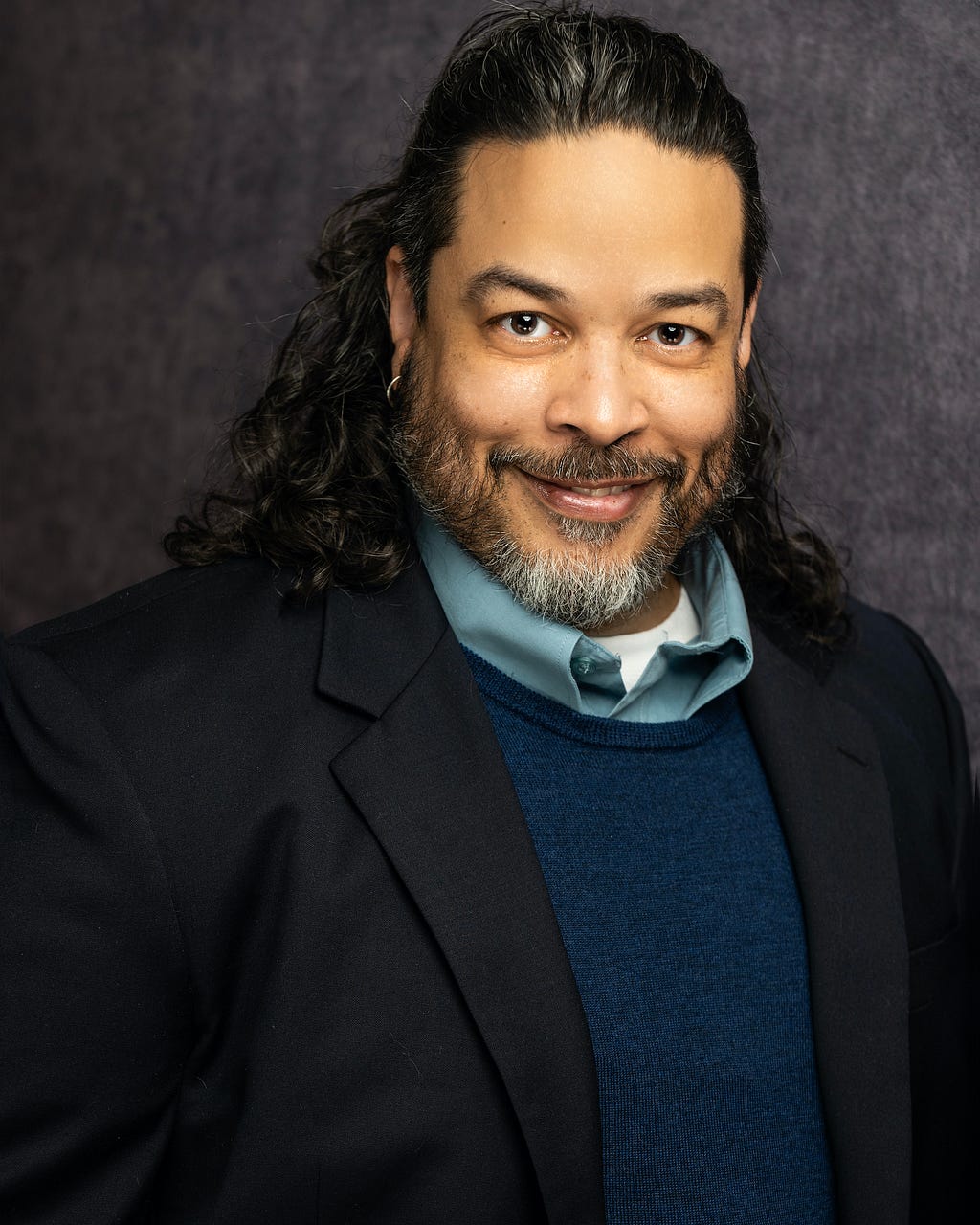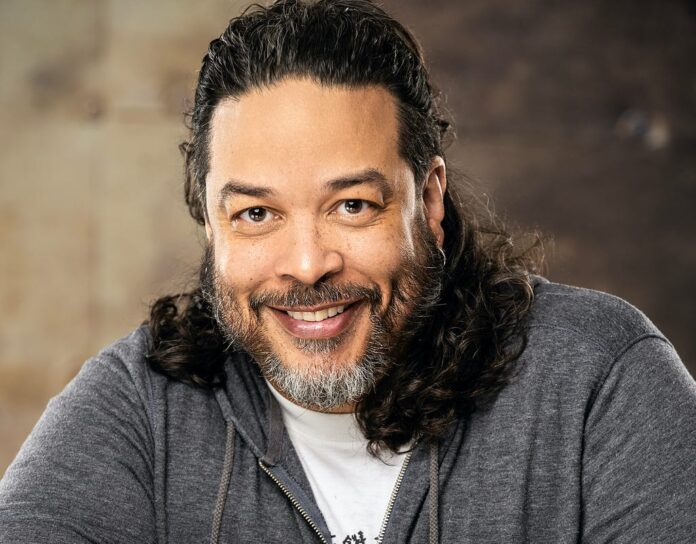It’s ok to be your authentic self. I spent a great deal of time trying to be what others expected me to be, whether it was as a kid in school, at home, or in my personal life as an adult.
As part of my series about “authors who are making an important social impact”, I had the pleasure of interviewing Charles Azulay.
Charles Azulay is a Dora Award-nominated actor and veteran of the Stratford Festival, whose remarkable journey from adversity to triumph serves as the inspiration behind his debut memoir “Uncoloured”. With a passion for storytelling and a commitment to self-empowerment, Charles continues to inspire readers worldwide with his unwavering resilience and indomitable spirit. He currently lives in Toronto with his husband and two dogs.
Thank you so much for joining us in this interview series! Before we dive into the main focus of our interview, our readers would love to “get to know you” a bit better. Can you tell us a bit about your childhood backstory?
I was born in St. Louis Missouri to a French Canadian mother and an African American father. When my parents split, my mother took my younger sister and I back to Canada, but shortly after abandoned us. We ended up in the Foster system there until I was about 4 or 5, and then adopted by a white family in Hamilton Ontario. I really struggled to fit in, and didn’t really cope well with the trauma I’d experienced. I’m not really sure my adoptive parents had the tools to deal with everything that came with that, which caused a great deal of conflict.
When you were younger, was there a book that you read that inspired you to take action or changed your life? Can you share a story about that?
The Colour Purple, by Alice Walker. I can’t tell you how many times I read that book. Something in me really connected with the main character of Celie. It wasn’t just her trauma, that resonated with me, but the social inequities which forced those who I considered “my people”, into that life.
It has been said that our mistakes can be our greatest teachers. Can you share a story about the funniest mistake you made when you were first starting? Can you tell us what lesson you learned from that?
This is probably way too much information, but since most of my mistakes were painful lessons to learn, one of the few funny ones I can tell happened very early on in my acting career. I was on a Broadway tour of “Miss Saigon” when my oldest daughter was born. The show was in Chicago, and because I was pretty exhausted balancing work and a newborn, I ended up catching some type of flu that was making it’s way through the cast. I’d called in sick one evening knowing full well I was in no shape to perform. Just before I could put on my pajamas and settle in for the night, our stage manager called. Apparently, because I still had a voice, and I was the least sick out of the leads, they had hoped I could come in and push through the show. I stupidly agreed, and as a result, during a scene in the second act, I made the decision to relieve some stomach gas, but I gambled…and lost. Soiling myself in front of 3,000 people was pretty humiliating, even though nobody was aware. I learned to stand my ground when I know I’m unable to do something, and when your sick, never trust that it’s just gas.
Can you describe how you aim to make a significant social impact with your book?
I’m really hoping to spark conversation about transracial adoption. My generation was traumatized by it, but nobody every really talked about how much it affected even the families that seemed to be happy.
Can you share with us the most interesting story that you shared in your book?
It would probably have to be about realizing and not taking for granted that because of my white parents, I group up with a certain amount of white privilege that of course completely disappeared when I left home. This was a huge shock to the system.
What was the “aha moment” or series of events that made you decide to bring your message to the greater world? Can you share a story about that?
During the initial lockdown in March of 2020, I Think I was monumentally naive to think that a global pandemic would bring people together. Instead it simply divided us, and the entire issue was so polarized, that it brought out the worst in some people. I realized that all of us are not as kind as we could/should be to others. We also don’t realize that everyone is going through something, and we all handle things differently. I am someone who, all my life has felt the need to always put on a happy face in order to cover my true feelings. Perhaps even feeling that if I’d admitted the struggles I had, that I would be perceived as being weak. I decided to share my story, knowing that many people who know me, would be shocked to know the truth of how my life actually was.
Without sharing specific names, can you tell us a story about a particular individual who was impacted or helped by your cause?
I have met some parents, mostly white, who have adopted children of colour, and one father in particular used to tell me that he beat himself up feeling that there was something that he couldn’t give to his son who was Vietnamese. Now the fact that he felt that way, was in itself a testament to him wanting to give that child everything, but after talking to him, I think he felt better knowing that all he really needed to do with his son was to support him on his journey of self discovery, and to not be offended if and when his son decides to focus on his culture. It’s not a reflection of him as a parent.
Are there three things the community/society/politicians can do to help you address the root of the problem you are trying to solve?
I think it’s slowly being addressed even within the foster system or adoption agencies. Unfortunately, with the fast paced lives most of us lead today, we prioritize certain things, and constantly making sure your child is comfortable with who they are, or the constant exposure to their culture isn’t always at the top of the list. I’m not sure if there is one solution, but it is definitely important to never forget that if you have adopted BIPOC children, that even if you find yourself in a discussion about race where you don’t necessarily feel comfortable, that supporting your child is paramount. When they leave home, you can no longer shelter them. They will inherently live very different lives from you simply because of who they are, and it’s important to recognize that and prepare them the best way you can.
How do you define “Leadership”? Can you explain what you mean or give an example?
A good leader is someone who lifts people up and encourages them to be the best that they can be, and can inspire by example.

What are your “5 things I wish someone told me when I first started” and why?
1. It’s ok to be your authentic self. I spent a great deal of time trying to be what others expected me to be, whether it was as a kid in school, at home, or in my personal life as an adult.
2. Trust the process. While editing my book, my biggest problem was constantly feeling the need to edit my own story when it came to the details. I discovered that I shouldn’t preoccupy myself with thinking about how others will feel when they read it. I needed to tell my truth, and just leave the reader to feel what they may.
3. It’s a slow process, so don’t give up There were a few times when the combination of reliving the past, and the difficulty of coming up with a way to write my feelings down became so overwhelming that I almost thew in the towel. I was lucky to have a partner who was very supportive and keep me focused.
4. When it came to my acting career, one of my role models did tell me; “don’t do too much too soon”. I never really understood what they meant, but as I got older, I realized that I was moving very quickly, and got pretty close to burning out.
5. When it comes to my writing, I wish someone had told me to pay more attention in English class when it came to grammar. I still struggle with it….lol
Can you please give us your favorite “Life Lesson Quote”? Can you share how that was relevant to you in your life?
The character of Sophia Petrillo from the Golden Girls once said: Anger is like a piece of shredded wheat caught under your dentures. If you leave it there, you get a blister, and you’ve gotta eat Jello all week. If you get rid of it, the sore heals, and you feel better. Over my lifetime, I’ve learned to let go of my anger at the past, and allowed myself to heal over time.
Is there a person in the world, or in the US with whom you would like to have a private breakfast or lunch with, and why? He or she might just see this, especially if we tag them. 🙂
Sarah Polley. She is someone who I’ve followed, and whose work I’ve admired. Also her revelation about her father in her documentary “Stories We Tell”, really resonated with me after I learned about my own biological mother and father.
How can our readers further follow your work online?
https://www.facebook.com/charles.azulay
https://charlesazulay.wpcomstaging.com/
https://www.instagram.com/charlesazulay/
This was very meaningful, thank you so much. We wish you only continued success on your great work!
Social Impact Authors: How & Why Author Charles Azulay Is Helping To Change Our World was originally published in Authority Magazine on Medium, where people are continuing the conversation by highlighting and responding to this story.


